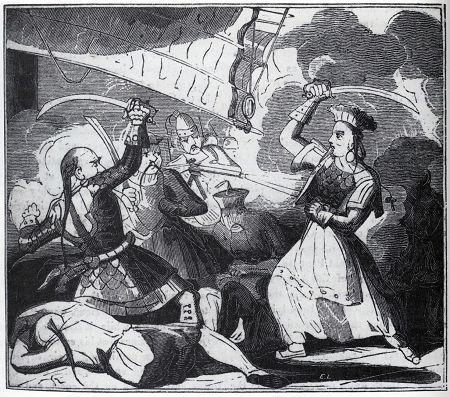Winner of the Spring 2019 StMU History Media Award for
The Article with the Best Introduction
The boiling clouds roll back, the tumultuous sky reduced to a slow simmer. A terrible maelstrom has just passed, wreaking havoc on this small fleet of ships. Shouting commands and curses, men in patchwork clothes run back and forth on the deck of a Chinese junk, hoisting its massive red sails to check for tears. Amidst the chaos, a crew member leans over the side, his eyes growing wide with shock and his words quivering at his lips. Crying out, he finally shouts the reason for his devastation.
Chuánzhǎng sǐle! The captain is dead!1
At this exclamation, the deck falls silent. The sails flap listlessly in the wind, accompanied only by the constant rainfall and the water that rocks the ship. Nobody says a word, the only break in the tableau being a crew member or two removing their hat in respect. Finally, from the cabin below the helm, a woman emerges into the gloom with a young man at her side. She has heard the news. Slowly, she makes her way across the ship to peer down into the sea below. Sure enough, she immediately spies her husband’s body floating like a piece of driftwood among the waves. However, instead of retreating to the cabin to mourn him, as was expected of a woman at that time, she turns to face the rest of the crew. A few high-ranking members have already convened to nominate a successor, but the woman waves her hand dismissively. There is no need for schemes, she says, for she will step up to fulfill the role. The young man beside her eagerly nods his head, immediately vouching for her. In stunned silence and with a perplexed curiosity, all eyes are on her. Who is this woman to assume command over an entire fleet of hardened pirates?2
Her official name was Cheng I Sao. Before that, however, she was Ching Shih.3
***
Ching Shih was born in 1775 to a poor family in Guangzhou, China, where she would grow up to work as a prostitute in a seedy brothel before her capture in 1801 by the infamous pirate captain Cheng I. He intended to exploit her in the same manner that he found her, but fell in love with her almost immediately upon bringing her back to his ship. From the moment she entered the scene, Shih exuded an aura of utmost poise and shrewd confidence. Only a few days after Shih nearly maimed the captain in a retaliatory assault, they were wed. Before the nuptials, though, Shih insisted she would only avow herself to him on one condition—that she would rule over his six fleets beside him. He agreed, and some time after, Shih bore him two sons. The couple later kidnapped and adopted an additional son named Chang Po Tsai during one of their many raids on small villages.4 For years, the family terrorized the southern coast of China—especially the area around the Pearl River Delta—until one fateful day in 1807. A typhoon unlike any other ravaged “the Red Flags,” their principal fleet. During the storm, Cheng I was swept overboard and later perished in the sea, leaving the crew without a captain. It was at this time that Shih stepped up to the plate and volunteered herself as leader, and, with her adopted son and lover vouching for her, it was generally agreed upon that he would become the commander of the Red Flags. Within a few years, Shih gathered around twelve hundred war junks and tens of thousands of buccaneers under her authority.5

During this period, the Emperor of China heard many reports from emissaries about the issue of piracy in the Middle Kingdom, including those of the dreaded Cheng I and his wife, the “Dragon Lady”; but, with so much on his agenda, he could barely spare any attention to these ragtag rapscallions aside from sending ships to investigate and engage in small skirmishes in harbors and up the river. Despite the Emperor’s lackadaisical attitude towards the situation, underestimating the Dragon Lady would soon prove a fatal mistake.6
Now a captain, Ching Shih proved herself an able leader through her management of finances and her establishment of a code of ethics. Aside from the standard fare of punishment for setting ashore without leave, it contained such unusual stipulations as forbidding the rape of female captives on pain of death, as well as requiring villagers to be paid compensation for certain supplies. Perhaps owing to her time spent in poverty as a prostitute, it seemed she held a tender spot in her heart for the most vulnerable among the population. Nevertheless, she refused to return to a life of destitution and was reported to have had no qualms about raiding as many villages as her fleets could manage, as well as ambushing imperial junks and charging protection for merchant ships hauling salt and opium. All passed relatively unnoticed, but when an important government official was killed in an attack, the Emperor finally took notice. He ordered the navy to track the “Dragon Lady” down to Macau, where a vicious standoff left the imperial forces defeated and the entire Pearl River up to Guangzhou available for the taking. Unfortunately, all this pillaging left her Red Flag fleet in desperate need of repairs and her funds in need of replenishing, so she retreated to the island of Lantau near Hong Kong to recuperate—the island where a great battle awaited her.7
***

It’s all quiet on the coastal front, a little too quiet. A northerly wind pushes onto the shore, the leaves in the trees rustling gently on the island of Lantau. Ching Shih sits at her desk, a portrait of sheer consternation, the wrinkles in her forehead having deepened over the course of the last few days. Reviewing her finances for what seems like the thousandth time, she sets the ink down and heads topside. It is only when she arrives on deck that she sees them. Imperial junks and Portuguese man o’ wars emerge from the morning mist like ghosts, all armed to the teeth and speedy to boot. Of course, she has been expecting a showdown like this for quite a while. She just wishes it had been a little later, as most of her flagship fleet is beached and out of use. Still, she shrugs and mutters a prayer to her deceased husband for protection and guidance. Now that she thinks about it, a shift in the breeze would do nicely at this point.8
Captain Ching Shih stares death in the face, as she has done many times in her life. This time, though, she does it with a smile. This time, she will win.9
***
Many days passed through fire and cannon shot in November of 1809, and the air turned black with smoke as volleys passed between the Chinese and foreign navies and Ching Shih’s meager forces. Only a few of her junks were in any sort of fighting shape, and they possessed next to nothing in capability compared to the juggernaut before them. To add salt to the wound, her most intimidating fighting power, the Black Flag fleet, had deserted Shih, even attacking the Red Flag fleet at some points. On top of that, the Red Flag fleet had been damaged in previous battles with the Chinese navy. In order to have at least a sliver of hope of victory, the remaining pirates cast flaming rafts in the water towards the enemy lines, aiming to gain the upper hand by burning their way to triumph, but the wind merely pushed them back towards Shih and her men. At last, when all hope seemed lost, a fortuitous change in the wind caused a flaming raft to smash straight into the midst of the blockade, sending a ship up in smoke. Gaining the upper hand, Shih and the pirates still loyal to her were finally able to get the most seaworthy junks on the waves to wage a great last stand, demolishing many of the enemy’s ships and pushing their way back into the Pearl River.10

The Emperor’s emissaries pressured her to surrender, but she continued to send her fleet to attack and raid around the Pearl River. However, after having balancing more conflicts with the Chinese government and the Black Flag fleet, Ching Shih realized that she must accept the offers of pardon. Although she agreed to surrender, being a woman of an immensely strategic disposition, she insisted that all terms be in her favor. Should the Emperor’s emissaries have balked and refused, she would simply resume her pillaging. After much negotiation and more than a fair amount of threats, legitimate and bluffed on both sides, the Chinese government was out of options and unable to refuse the famed Dragon Lady. They agreed to allow her and her crew to surrender with amnesty from the original executions they were sentenced to, in addition to all the wealth that Shih amassed since the day she married Cheng I in 1801. Retiring at the age of thirty-five, Shih inevitably returned to the brothel she wished she’d never see again—this time, however, as a very rich and successful manager, never to live in poverty again until she passed away at the age of sixty-nine.11
***
Resting by the water, an aging Ching Shih is reminded of the dauntless years of her youth. In small ripples on the surface, she sees distorted reflections of her beloved husband, the battles she fought, and the conquest of the waves which will forever be attributed to her name. No longer wielding a cutlass or beheading unruly subordinates, Shih has found peace at long last.12
- Pirates Through the Ages Reference Library, 2011, s.v. “Pirate Surrender Document.” ↵
- Pirates Through the Ages Reference Library, 2011, s.v. “Pirate Surrender Document.” ↵
- Pirates Through the Ages Reference Library, 2011, s.v. “Sao, Cheng I.” ↵
- Pirates Through the Ages Reference Library, 2011, s.v. “Sao, Cheng I.” ↵
- Pirates Through the Ages Reference Library, 2011, s.v. “Pirate Surrender Document.” ↵
- Alfred S. Bradford, Flying the Black Flag (Westport: Praeger Publishers, 2007), 144-148. ↵
- Cheng I Sao – Pirate Queen, video file, 10:50, YouTube, posted 2013, https://www.youtube.com/watch?v=-p2lhxUqMMQ. ↵
- Cheng I Sao – Pirate Queen, video file, 10:50, YouTube, posted 2013, https://www.youtube.com/watch?v=-p2lhxUqMMQ. ↵
- Cheng I Sao – Pirate Queen, video file, 10:50, YouTube, posted 2013, https://www.youtube.com/watch?v=-p2lhxUqMMQ. ↵
- Cheng I Sao – Pirate Queen, video file, 10:50, YouTube, posted 2013, https://www.youtube.com/watch?v=-p2lhxUqMMQ. ↵
- Ann Shen, Bad Girls Throughout History: 100 Remarkable Women Who Changed the World (San Francisco: Chronicle Books, 2016), 45. ↵
- Ann Shen, Bad Girls Throughout History: 100 Remarkable Women Who Changed the World (San Francisco: Chronicle Books, 2016), 45. ↵



67 comments
Mariah Cavanaugh
The Empress Ching Shih was obviously in charge of her own destiny and would let nothing stand in her way, especially with the nickname the “Dragon Lady.” Congratulations on writing such a powerful and impressive article on an amazing woman! Ching Shih’s life was filled with loss and heartache but she refused to be a damsel in distress, instead she fought back.
Priscilla Reyes
The article presents a powerful story of overcoming. The images show she was capable, strategic and successful, just like the conclusion does. I appreciate the storyline and information presented because it never gives a complaint about anything, it just states her hard work. I found it interesting she married and became one with her husband. Together at war, I can only imagine all that they went through. Nevertheless, the conclusion is unique because she is at peace and no other article had ended like this for me.
Antonio Coffee
The intro to the article was very well written. It placed us in the middle of the action immediately and made the reader curious about what was going on. It made me want to see more of the story. It ended on a great note by giving a segway to the beginning of the story. The article used pictures that showed how the story was progressing and forming. They always seemed placed in such a way that they added to the point of the story they were near.
Engelbert Madrid
Ching Shih was quite an interesting Chinese figure, and I think what made her a great leader for her team was because of her courage, determination, strength, and power that only lead her group of men to stay firm. Ching Shih could have left the group of pirates once her husband, who was the captain before her, was killed during a battleship. However, she had a profound connection with him; therefore, she remained to stay with them until her death.
Joshua Garza
I can tell this was a well written article. I liked the detail put into this article. Its Phenomenal. This is an amazing story that took place long time ago but still has relevance today. I admire the way your timeline flows. I learned a great deal of things from this article. Thank you for putting this together for the enlightenment of the reader and com-mentor.
Nathalie Figueroa Soto
Interesting premise, a great introduction, lively pictures, this article really was a nice treat to read. Even after starting out in a life of poverty, in a brothel no less, Ching Shih was still able to make the best of her circumstances to succeed. She played all the cards to her advantage, such as when she surrendered with grace and many gains in the end against the Chinese government, and I really admire her for this. At this time where women were considered little more than bedmates, she really managed to show everyone that she was greater than that. At the end, even though she returned to the brothel, this time she was there as the manager, the boss. Her story was truly incredible, and even more fantastic to read. Well done!
Thomas Fraire
I love China’s history and learning about how different all the dynasties were, that is why I clicked on this article. It is really cool to see how amazing this empress is and how great it is to see her thriving in a time period where women were seen as beneath men. It is really cool to see that she tried to honor her husband who was murdered, and I think she did it well. Great article and topic, congrats on your nomination
Nadia Carrasco
I really enjoyed this article, I am a fan of articles about women overcoming challenges and becoming successful. Ching Shih and her position as Captain and how she was determined to be successful was very inspiring to read about. The pictures flowed well with the article and made it fun to read. The author did a great job overall.
Krystal Rodriguez
I love reading articles about women overcoming challenges and becoming successful. She had a rough childhood and had to go through a lot. She was very courageous in what she did and had nothing to lose. She took that step to get to where she wanted to be. She was smart, statistical, and had a way with words. This article did a very good job at showing this and used some incredible images to further illustrate that.
Danniella Villarreal
I really loved these pictures, and I also really liked the title. A classic revenge story that I feel everyone should know about! A lot of history’s most interesting and amazing warriors are always shoved to the bottom of the barrel. The last image was very interesting to look at.